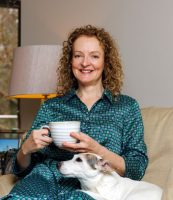Helen was working as a clinical nurse in 2009 and was involved in running a course in acute illness management (the AIM course). Her hospital had a health partnership with a hospital in Gulu, Uganda, and Helen was asked if she would like to teach the course there. She says she set off with a lot of trepidation, as she didn’t feel she was particularly “an adventurous person” but recognised it as an opportunity.
It was very different to what Helen expected:
“In my naivety I thought there would be someone at the hospital who would be expecting me. Maybe someone with some educational remit who I could work alongside and talk about the course. And none of that happened. It felt as if we weren’t expected. So yes, it was incredibly challenging, but I was mindful I’d been given a job to do, and I thought I’ve got a I’ve got to find a way of seeing how I can make something work“
Helen used her persistence and passion about the course to explain to local staff why she was there. The hospital staff and university agreed some dates, and then some adapted training went ahead.
Helen found teaching the medical students in Uganda similar to teaching students in the UK, although there was an occasion when the group burst out laughing. She couldn’t understand why and asked what was funny. Helen had been giving a UK-based scenario, and the students explained that in their setting, that would never happen. So, Helen learned to adapt to the cultural differences and, on reflection, feels she could have prepared herself more before the experience, as at the time this wasn’t included in a pre-trip induction, and she had not researched into the country. However, Helen recognises that the students’ enthusiasm really inspired her: “I came out of it feeling really proud of myself that I’d managed to make something work that had felt really challenging.”
After Helen’s first trip to Gulu, she was inspired to apply for grants (something she had never done before), and was successful, allowing her to run several more AIM courses. This started her passion for working in an overseas environment.
Helen identifies that she gained confidence, resilience and problem-solving skills from these trips:
“I was doing things I never thought I could do.” Helen became aware “that everyone was looking to me to be the leader when I hadn’t thought of myself in that role. There was an incident that happened, and everyone looked at me to sort it out. And I remember thinking, Oh my goodness, they all think I know what I’m doing and I don’t. But I had to find a way of making something work.”
Although Helen was also working full time in the NHS, her manager was supportive as they recognised the value of the experience for Helen. She then applied for the lead of the health partnership, so the overseas work became her career, as she used her understanding of managing volunteers and the overseas relationships. Her aim was to give to others the opportunities to experience what Helen had, but in a more supported way. She encourages volunteers not to be surprised if things are ‘a little chaotic’ on arrival, and “not to worry as things tended to sort themselves out” once you are there in person, and by the end of the trip “they will have achieved what they need to achieve”. Helen now works for Health Education England managing projects, putting structure into the volunteers’ experience. She is currently working on capacity building of local staff in using a CT scanner.
What would Helen say to someone thinking about a global learning opportunity?

“Go for it! I can say that because I was someone who’d never thought I would do this type of opportunity. So I would appeal to the people who think “I don’t really know whether it’s for me”. I would encourage them to be brave and bold and go for it because it’s really a life changing opportunity. Yes, there are bumps in the road, but that’s part of the process and… understanding that…. it’s just part of it. I have absolutely no regrets.“